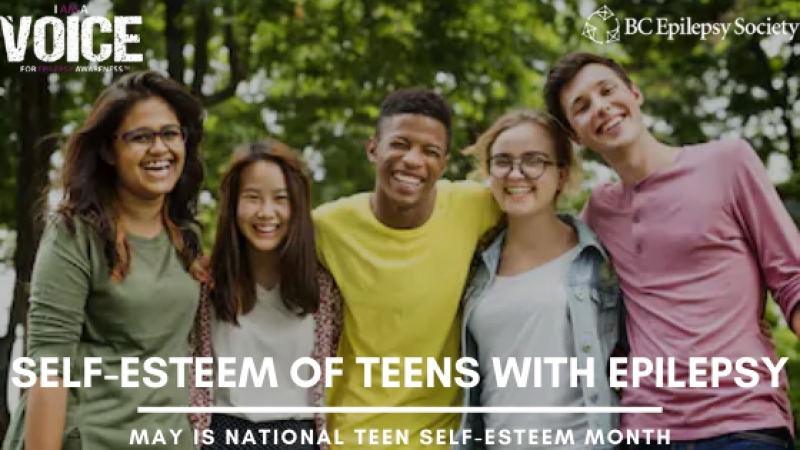May is National Teen Self-Esteem Month – Self-Esteem of Teens with Epilepsy

May is National Teen Self-Esteem Month and we think that it is a great time to talk about the importance of self-esteem for teens with epilepsy.
It has been found that people with good self-esteem have positive feelings about themselves, have healthy relationships, are usually better at dealing with life’s challenges and believe if themselves.
On the other hand, it has been found that people with poor self-esteem have negative feelings about themselves, may find it harder to have healthy relationships, tend to be less able to deal with life’s challenges and have difficulty believing in themselves.
With regards to epilepsy, studies have shown that epilepsy can have an impact on self-esteem. For example, you might have:
- Loss of independence and needing to rely on others
- A change in how you think about yourself
- Feeling less able to do your job, schoolwork, etc.
- Being told by others that you can’t do things because of your epilepsy
- Experiencing negative reactions from others due to stigma
- Experiencing a negative self-image of yourself due to epilepsy
There is a great importance in discussing how to improve self-esteem for all teens, including teens with epilepsy.
Here are some of our tips on things that teens with epilepsy, can do to try and improve their self-esteem:
- Recognize your negative thoughts and beliefs: Positive thinking is a great way to improve your self-esteem. Negative thoughts and beliefs can lead to poor self-esteem. If you can recognize your negative thoughts and beliefs, you can find ways to combat them with positive thinking.
- Do things that you enjoy and are good at: Rather than focusing on what you are not good at due to your epilepsy, it can be helpful to think about the things you enjoy and are good at to improve your self-esteem. For example, if you like baking and are good at baking, you can try baking some treats for your family.
- Try to be kinder to yourself: Give yourself the same kindness, care, and compassion like you would to others. Think about what you would say to someone else in your situation and say it to yourself rather than being negative to yourself. Additionally, if you make a mistake, instead of criticizing yourself, remember that you are only human and allow yourself to make mistakes.
- Avoid comparing yourself to others: Remember that everyone is different with their own strengths and skills. It is important to focus on your own strengths and skills rather than comparing yourself to other people.
- Get your seizures under control as best as you can: Studies show that people with well-controlled epilepsy are less likely to suffer from low self-esteem than those who have poorly controlled epilepsy. Doing things like taking your medications regularly and following the advice of your healthcare professional may help to keep your seizures under control and help to improve self-esteem.
- Find ways to help you better manage your stress: It has been found that people with low self-esteem and anxiety may benefit from relaxation techniques, such as mindfulness, deep breathing, yoga, tai chi, meditation, guided imagery, music/art therapy, etc. Additionally, studies have shown that stress management has been linked to better seizure control. Please click here for information on epilepsy and stress.
- If you need it, seek out help from a professional: If feelings of low self-esteem persist, you may choose to seek help from a professional. You may choose to see a registered clinical counselor, a psychologist, a psychiatrist, a neuropsychologist or a neuropsychiatrist.
- Seek out support by joining one of our support groups: It has been found that receiving regular support can improve self-esteem. The BC Epilepsy Society offers many support groups, including the Epilepsy Friends Forever (EFF) friendship group for people with epilepsy aged 6-17 and the Young Adults with Epilepsy online support group for people with epilepsy aged 18-24. Please click here for more information on our weekly online support groups.
We hope that our tips help you to improve your self-esteem! As always, if you need information or support during this time, please feel free to reach out to us at 604-875-6704 or at info@bcepilepsy.com.





